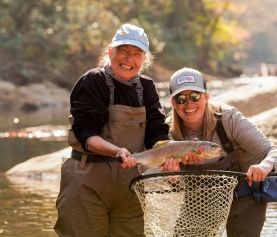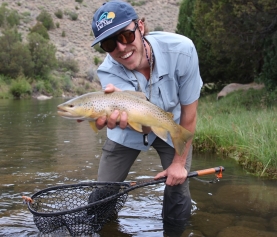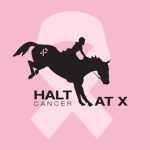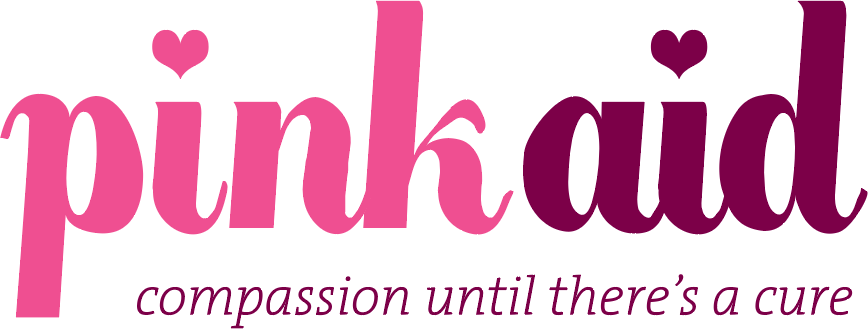Mending Lines – Rick Liquie x Keith Marcott
Casting for Recovery’s (Men)ding Lines series is back! Each month, we will highlight a male river helper, donor or volunteer who is supportive of CfR. This month we feature not one, but two river helpers. Meet Rick Liquie and Keith Marcott, both longtime river helpers for Casting for Recovery Wyoming and very good pals.
Tell us about yourself and how you became interested/involved in the sport of fly fishing?
Rick Liquie: I have fished my entire life. But did not start fly fishing until 1998. My wife was attending a conference for work in Jackson Hole, Wyoming. We drove to Dubois to visit someone who worked for her. We fly fished with a guide and loved not only the fishing but also the area. We returned for several years each summer and eventually bought a home in Dubois on the Wind River so we could fly fish out our “back door.”
Keith Marcott: I grew up in a fishing family on Long Island, but we fished salt water and there were no flies involved. However, I had the great good fortune to have a social studies teacher in junior high who was an avid fly fisher and started a club to introduce students to the sport. Even so I didn’t get really hooked until college when I found some other guys that were die-hards. After that there was no turning back. In the 45 years since, I’ve been very lucky in that I have gotten to fly fish for many species all over the country, as well as the Scotland, the Caribbean and South America.
When did you get involved with CfR and what makes you want to return as a river helper to continually support CfR?
Rick: In 2008, my wife and I volunteered as river helpers in the Carolinas/GA program. We continue to assist with that program. My wife Mary, launched the Wyoming Program in 2011 and I am a river helper there too. I want to return each year because I enjoy the “fishing day” and seeing the thrill that the women have when they catch a fish. The celebration at the end of the retreat is also a very special time with laughter and tears and joy. CfR is also a way for me to “pay it forward” since I received tremendous support when I was diagnosed with cancer and went through treatment.in 2013. Support from others really helped me through – and I feel that volunteering with CfR is a way to help others who are on their cancer journey. I love to see the women leaving the retreat more relaxed and with a connection to others. I think when they leave, they no longer feel that they are alone in dealing with cancer.
Keith: My wife Ann was a participant in the second Wyoming retreat, and I had the opportunity to meet some of the staff and river helpers when I came to pick her up at the end of the weekend. Two things: First -everyone I met was clearly dedicated to what they were doing, and it was easy to see they were emotionally charged at the event. Second, and most important, it was clear to me that the retreat had a significant impact on Ann and that she was in a better place coming out of the weekend. I volunteered the next year and have participated every year since except one when I was out of the country. I’m not sure I can put into words why I keep coming back other than to say I wouldn’t miss it!
What’s your memorable experience (with a participant or at a CfR retreat) that stands out in your mind?
Rick: There are many from the last 14 years. For 4 years, I had always fished with women at a bridge on the Wind River. Each year we would hook a fish under the bridge but had never landed one. In the 4th year, the woman I was fishing with landed the fish – and immediately plopped down on a little sandy bank and said “I’d love a beer” and I said that sounds good. She then shared with me that she doesn’t drink!!
In 2015, I was fortunate to guide one of the women who was interviewed by Hallie Jackson for a segment on the NBC News. Tonia loves Twizzlers so every time she made a really good cast, I gave her a Twizzler. Hallie Jackson finally asked her “Is it important to you to catch a fish?” Tonia said “Not really” and of course she immediately hooked into a nice rainbow trout. I was willing to jump in the water to land that fish – and I can’t even swim! Tonia admitted that it was fun to actually catch a fish that day.
Keith: There have been many, but one that really sticks out was the year I was helping a woman who, although not yet much of a fly fisher, spent a lot of time outdoors and was very self-sufficient. I had been told that she might need some assistance with navigating uneven terrain, but as the morning went by, she steadfastly refused to let me help her in that regard. There came a time when we agreed it was time to move down the shore to a new spot. Again, I offered her my arm and again she refused, telling me not to worry and she’d be right behind me. Just after I rounded a small point I heard an exclamation and a splash behind me. I turned to see her sitting in the pond with water over her waders! Before I could even get to her, she was back up and assuring she would tell everybody, and especially Mary, that it was all her fault so I shouldn’t worry!
What words of encouragement would you give to a breast cancer survivor who is hesitant about attending a Casting for Recovery retreat because they don’t fly fish?
Rick: My sister is a breast cancer survivor. I encouraged her to attend a retreat but she was hesitant because she doesn’t fish. She applied and attended a retreat in Michigan. After the retreat, she shared with me that “After 15 years, I didn’t realize I still needed to offload part of what happened during my cancer journey.”
Keith: The best encouragement I can give is that my wife went through it and came away better for it. And considering that she was not at all into fly fishing before, and now has better equipment than I had for the first 25 years I fished, I can definitely say that she came away with a new appreciation for and interest in the sport.
Do you have a ‘lucky’ fly that you use on CfR retreat waters?
Keith: The one that’s catching fish.
Rick: No – I use whatever is working that day – dries, nymphs, streamers – I’ve even been known to use a Mop Fly if that’s what it takes! If I can offer one other observation, It is true that I return as a river helper each year because I believe in the cause. I believe in giving back. And I believe in the effectiveness of the program. Beyond all that I truly look forward to the weekend because I get a chance to spend time and catch up with some of the most dedicated and giving people I’ve ever met. I enjoy their company and I get a charge just being around them. At least a few have become very dear friends.



















